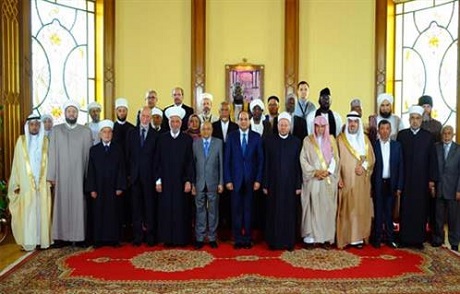
Egyptian President Abdel Fattah El-Sisi along with top clerics from 50 different countries who have been meeting him on the sidelines of a conference to combat extremist fatwas (Photo: Al-Ahram)
On the sidelines of a two-day conference being held between top muftis from around the world in Cairo, Egyptian President Abdel-Fattah El-Sisi met on Tuesday a number of the clerics to discuss means to combat extremist fatwas (edicts).
Titled "Fatwa- Current Obstacles and Future Prospects," the conference was launched on Monday by Dar El-Ifta, Egypt's primary authority responsible for issuing religious edicts, and is being held to "curb extremist thought and terrorism under the name of religion."
The Egyptian president stressed to delegates the crucial role of both religious institutions and clerics in fighting "terrorism and extremism", Alaa Youssef, the spokesperson for the Presidency said in a statement.
Egypt's Prime Minister Ibrahim Mahlab and other Egyptian ministers also attended the conference and highlighted the importance of religious institutions and their role in Egyptian society.
During his speech, Mahlab said that the conference aims to discuss methods to combat challenges made by those "that wish to spread sedition and extremism."
The clerics from 50 different countries arrived in Cairo to tackle the concept of fatwas and their effect on societies, how fatwas could confront religious extremism as well as how they could encourage moderation and progress, according to a statement by the foreign ministry on their Facebook page.
The conference is also set to launch several initiatives, including an international institution for fatwas based in Cairo.
The ministry described the initiative on their Facebook page as an organisation that aims to foster coordination between the different religious institutions so that fatwas are issued methodically, systematically and are able to confront unqualified individuals practicing edicts.
The Egyptian president has continuously called for a renewal of Islamic discourse to challenge extremism.
Since the ouster of Islamist president Mohamed Morsi in July 2013, the Egyptian cabinet, presidency and the country's leading Sunni Islamic institute, Al-Azhar, have taken measures to curb the spread of extremist ideas.
In March, the religious endowments ministry, one of the country’s top state religious bodies, decided to place all Islamic cultural institutes and preacher training centres under its direct supervision starting from the next academic year.
The religious endowments ministry also said that it would not allow educational centres, which have been operated in the past by independent religious associations, to be used “as a backdoor for [teaching] extremism or terrorism.”
The move came in a series of measures taken by the ministry and Al-Azhar.
The Egyptian state has continually blamed the now banned Muslim Brotherhood for creating the "jihadist ideology" that it says is used by extremist groups worldwide.
Short link: